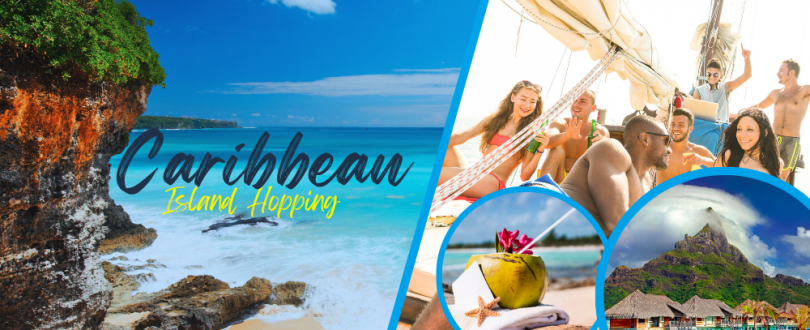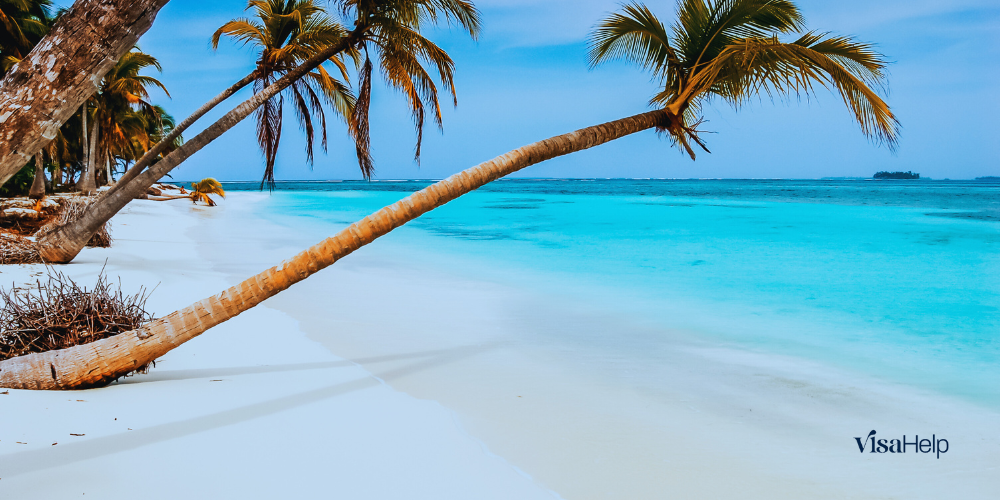
Imagine hopping from one idyllic island to another, each with its unique charm, culture, and picturesque scenery. That’s the allure of island hopping in the Caribbean, a dream for many travelers. This ultimate guide offers insights and tips to help you plan your perfect Caribbean adventure.
Understanding the Caribbean Archipelago
The Caribbean Archipelago is a mesmerizing collection of islands each boasting its own unique charm. Here’s what you need to know:
- Geographical Diversity: The Caribbean is home to over 7,000 islands, islets, reefs, and cays. The islands are generally grouped into the Greater Antilles and the Lesser Antilles.
- Cultural Richness: These islands are a melting pot of cultures, influenced by African, European, Asian, and Indigenous heritages. This diversity is reflected in the languages, cuisines, music, and traditions across the archipelago.
- Natural Beauty: Known for their stunning beaches, lush rainforests, and vibrant coral reefs, the islands offer breathtaking natural landscapes. Each island, from the mountainous St. Lucia to the flat arid Aruba, presents its distinct environment.

Planning Your Island Hopping Adventure
Planning is key to a successful island-hopping adventure. Here’s how to get started:
- Selecting Islands: Choose islands based on your interests – be it adventure, relaxation, culture, or nature. Research each island’s unique offerings to build a diverse and fulfilling itinerary.
- Timing Your Visit: The best time for island hopping is during the dry season, from December to April, to avoid the hurricane season and enjoy pleasant weather.
- Budgeting: Consider your budget as costs can vary significantly from one island to another. Include transportation, accommodation, food, activities, and any entry fees in your budget planning.
- Duration of Stay: Determine the length of your stay on each island. Some islands can be explored in a day or two, while others may require a longer visit to fully experience their attractions.
Transportation: Navigating Between Islands
Moving between islands can be an adventure in itself, with several options available:
- Ferries: Many islands are connected by regular ferry services, which can be a cost-effective and scenic way to travel. Ferries are ideal for shorter distances and for those who prefer slower travel.
- Flights: For longer distances or to save time, regional airlines provide inter-island flights. Some islands have small airports where only specific regional carriers can land.
- Charter Boats and Yachts: For a more personalized experience, consider renting a charter boat or yacht. This option offers flexibility and the opportunity to explore smaller, less accessible islands.
- Cruises: Caribbean cruises offer a hassle-free way to see multiple islands with accommodations, transportation, and meals all included.
Exploring Island Activities
The Caribbean islands offer a plethora of activities that cater to a wide range of interests and preferences:
- Water Sports: With their crystal-clear waters, the islands are perfect for water-based activities like snorkeling, scuba diving, sailing, and fishing. Destinations like the Cayman Islands and Belize are renowned for their spectacular diving sites.
- Beach Relaxation: For those seeking relaxation, the Caribbean beaches are ideal. From the famous Seven Mile Beach in Jamaica to the secluded coves of St. Vincent and the Grenadines, there’s a beach for every type of traveler.
- Cultural Tours and Historical Sites: Explore the rich history and culture of the islands. Visit colonial towns, sugar plantations, and historical forts. In Puerto Rico, the old town of San Juan and its fortresses offer a glimpse into the region’s colonial past.
- Nature and Wildlife: Hike through lush rainforests, visit waterfalls, or go bird-watching. Islands like Dominica and Trinidad are known for their rich biodiversity and natural beauty.
- Adventure Activities: For the adventurous, activities like zip-lining in St. Lucia, caving in Barbados, or mountain biking in Jamaica are thrilling ways to explore the islands.
Sampling the Local Cuisine
The Caribbean cuisine is as diverse as its islands, characterized by a blend of African, European, Indian, and native influences:
- Local Specialties: Each island has its signature dishes – from jerk chicken in Jamaica to roti in Trinidad and Tobago. Seafood is a staple in the Caribbean diet, with dishes like conch fritters and grilled fish being popular.
- Street Food: Don’t miss out on the street food experience. It’s an affordable way to taste authentic local flavors. Try delicacies like doubles in Trinidad, fishcakes in Barbados, or the ubiquitous rice and beans found across the islands.
- Local Markets and Food Tours: Visiting local markets and participating in food tours can provide an immersive culinary experience. It’s also a great way to interact with locals and learn about the island’s food culture.
- Fine Dining: Many islands also offer fine dining experiences, combining local flavors with international culinary techniques, often in stunning settings.
Accommodation Options for Every Traveler
The Caribbean offers a wide range of accommodation options to suit different budgets and travel styles:
- Luxury Resorts: For those seeking luxury and all-inclusive options, resorts in the Bahamas, Turks and Caicos, and St. Lucia offer world-class amenities and services.
- Boutique Hotels and Villas: Smaller boutique hotels and private villas offer more personalized experiences. They are often located in unique settings and provide a more intimate glimpse into island life.
- Budget-Friendly Options: For budget-conscious travelers, there are guesthouses, hostels, and budget hotels that offer basic amenities without a high price tag. Camping on the beach is also an option on some less-developed islands.
- Eco-Lodges: For eco-conscious travelers, eco-lodges and green hotels focus on sustainability and minimizing environmental impact while providing comfortable accommodations.
Cultural Experiences and Events
The Caribbean islands are not only about sun, sea, and sand; they are also rich in culture and host numerous events throughout the year.
- Festivals: Many islands host vibrant festivals. Notable ones include Trinidad’s Carnival, known for its lively music and colorful parades, and Barbados’ Crop Over Festival, celebrating the end of the sugar cane season.
- Music and Dance: Reggae in Jamaica, Soca in Trinidad, and various other musical styles can be experienced live at local venues and nightspots. Traditional dance performances are also a great way to immerse in the local culture.
- Historical Tours: Many islands have a rich colonial history. Guided tours of historical sites like forts, plantation houses, and museums offer insights into the past.
- Art and Craft Markets: Local art and craft markets are perfect for experiencing and purchasing authentic Caribbean art. They reflect the islands’ diverse cultural influences and creativity.
Eco-Tourism and Sustainable Travel
Eco-tourism is gaining popularity in the Caribbean, promoting sustainable travel and environmental conservation.
- Eco-Friendly Accommodations: Many islands offer eco-lodges and green hotels that use renewable energy, water conservation methods, and sustainable building materials.
- Wildlife and Nature Conservation: Various eco-tours allow visitors to appreciate the islands’ biodiversity. Activities include bird watching, visiting marine parks, and participating in wildlife conservation programs.
- Responsible Practices: Travelers are encouraged to practice eco-friendly habits such as reducing plastic use, respecting wildlife, and supporting local conservation efforts.
Navigating Visa and Entry Requirements
Visa and entry requirements in the Caribbean vary depending on your nationality and the specific island.
- Visa Policies: Some islands may require visas for certain nationalities, while others offer visa-free entry or visas on arrival. Always check the entry requirements for each island you plan to visit.
- Documentation: Typically, you will need a valid passport, return or onward tickets, proof of accommodation, and sometimes evidence of sufficient funds for your stay.
- Travel Advisories: Before travel, check for any advisories or specific entry protocols, especially in the context of health and safety regulations.
Safety and Travel Tips
Traveling in the Caribbean is generally safe, but it’s important to take standard travel precautions.
- Health Precautions: Protect yourself from mosquito-borne diseases by using repellent and wearing appropriate clothing. Stay hydrated and protected from the sun.
- Local Laws and Customs: Respect local laws and customs. Drug offenses can carry severe penalties, and some islands have strict laws on camouflage clothing.
- Travel Insurance: It’s advisable to have travel insurance that covers medical emergencies, especially if you plan to engage in water sports or other adventure activities.
- Emergency Preparedness: Be aware of hurricane season (June to November) and familiarize yourself with safety procedures in case of natural disasters.
Island hopping in the Caribbean offers an unforgettable experience filled with diverse cultures, stunning landscapes, and the rhythmic beats of island life. With careful planning and an adventurous spirit, you’re set for a memorable journey. For those concerned about the complexities of travel and visa requirements, Visahelp offers specialized assistance to simplify the process, ensuring that you have all the necessary documentation for a hassle-free Caribbean adventure.
Dreaming of island hopping in the Caribbean or do have experiences to share? Comment below with your stories or questions, and let’s make your Caribbean travel dreams a reality!

